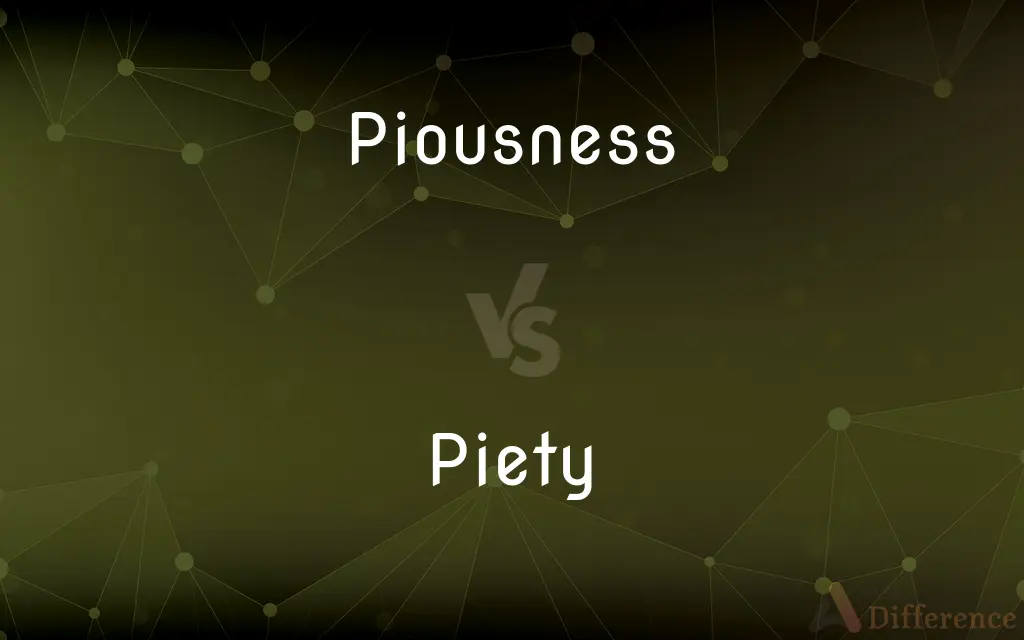Piousness vs. Piety — What's the Difference?
By Fiza Rafique & Urooj Arif — Updated on April 16, 2024
Piousness and piety both refer to the quality of being religious or reverent, with piousness often implying the expression of these traits, while piety emphasizes the deeper, more inherent quality of devotion.

Difference Between Piousness and Piety
Table of Contents
ADVERTISEMENT
Key Differences
Piousness often refers to the outward expression or the act of being devout in religion, focusing on observable behaviors and practices. On the other hand, piety is more about the internal commitment and reverence towards religious duties and ethics.
When discussing religious practices, piousness can sometimes carry a connotation of being overly devout, possibly for the sake of appearance. Whereas piety is typically seen as a genuine, heartfelt devotion that is less concerned with outward appearances.
Piousness can be demonstrated through frequent participation in religious rituals and verbal expressions of faith. Conversely, piety is often reflected through personal, sometimes private, acts of worship and a consistent moral lifestyle.
In historical texts, piousness is often used to describe characters or individuals in a way that may suggest either sincerity or hypocrisy. Piety, however, is usually described in a manner that invokes respect and admiration for the individual's deep faith.
While both terms are about religious devotion, piousness tends to focus more on the public and social aspects of religion, which can be interpreted differently based on the observer’s perspective. Piety, in contrast, is deeply personal and generally regarded as more sincere and introspective.
ADVERTISEMENT
Comparison Chart
Definition
The quality or state of being pious.
Deep respect towards religious obligations.
Connotation
Often external or observable actions.
Inherent, heartfelt devotion.
Perception
Can be perceived as insincere or performative.
Generally viewed as sincere and respectable.
Focus
Public expressions of faith.
Private and personal devotion.
Usage in Literature
Sometimes negative or hypocritical.
Typically positive and admired.
Compare with Definitions
Piousness
A tendency to emphasize religious adherence in daily actions.
She demonstrated her piousness through her countless charitable acts.
Piety
The quality or state of being pious, inner moral adherence to religious duties.
Her piety was known throughout her community and inspired many.
Piousness
Sometimes implies a superficial or hypocritical religious devotion.
Critics argued that his piousness seemed more performative than sincere.
Piety
A sincere adherence to religious convictions beyond mere appearances.
Unlike the outward piousness some displayed, her piety was quiet and profound.
Piousness
Exhibiting a dutiful spirit of reverence for God or an earnest wish to fulfill religious obligations.
His piousness was evident from his regular attendance at church.
Piety
Deep religious commitment often shown in personal practice.
The monk’s piety was evident in his simple living and daily meditations.
Piousness
Associated with devout behavior, possibly for appearances.
Her piousness was questioned by those who knew her private actions.
Piety
Regarded as a venerable and respected attribute in many cultures.
His piety earned him the respect of all who knew him.
Piousness
The act or condition of being religious or reverent.
The piousness of the community could be felt in their shared prayers.
Piety
Reverence and devotion to God typically expressed through actions and thoughts.
His piety was reflected in his humble lifestyle and kindness towards others.
Piousness
Earnestly compliant in the observance of religion; reverent or devout
A pious nun.
Piety
Religious devotion and reverence.
Piousness
Showing or characterized by religious devotion
Pious observance.
Piety
Devotion and reverence to parents and family
Filial piety.
Piousness
Expressive of or used in religious devotion; devotional
Pious readings.
Piety
A devout act, thought, or statement.
Piousness
Done for the benefit of others or with the intention of encouraging good
Practicers of the noble lie and the pious fraud.
Piety
A position held conventionally or hypocritically.
Piousness
Sincere but wishful or far-fetched
A pious hope that the new method will work.
Piety
A statement of such a position
"the liberated pieties of people who believe that social attitudes have kept pace with women's aspirations" (Erica Abeel).
Piousness
(Archaic) Professing or exhibiting traditional morality; dutiful.
Piety
Reverence and devotion to God.
Colleen's piety led her to make sacrifices that most people would not have made.
Piousness
The condition of being pious; piety.
Piety
(uncountable) Similar reverence to one's parents and family or to one's country.
Piousness
Righteousness by virtue of being pious
Piety
(countable) A devout act or thought.
Piety
(countable) A belief that is accepted unthinkingly and with undue reverence.
Piety
Veneration or reverence of the Supreme Being, and love of his character; loving obedience to the will of God, and earnest devotion to his service.
Piety is the only proper and adequate relief of decaying man.
Piety
Duty; dutifulness; filial reverence and devotion; affectionate reverence and service shown toward parents, relatives, benefactors, country, etc.
Conferred upon me for the pietyWhich to my country I was judged to have shown.
Piety
Righteousness by virtue of being pious
Piety
Piety is a virtue which may include religious devotion or spirituality. A common element in most conceptions of piety is a duty of respect.
Common Curiosities
How are piousness and piety portrayed in religious texts?
In religious texts, piety is generally portrayed as a positive, respected quality, while piousness can sometimes have negative connotations if it seems hypocritical.
How can one cultivate genuine piety?
Genuine piety can be cultivated through introspection, sincere practice of religious tenets, and a personal commitment to living a morally upright life.
Can someone be pious without being truly pious?
Yes, a person can display piousness (outward religiosity) without possessing true piety, which is more about internal faith and sincerity.
What is the key difference between piousness and piety?
The key difference is that piousness often refers to outward expressions of faith, which can be perceived as performative, while piety denotes a deeper, more genuine religious devotion.
How do different religions view piousness?
Different religions may place varying emphasis on piousness, with some stressing the importance of visible adherence to religious norms.
How can piety influence a person’s lifestyle?
Piety often influences a person's choices and behaviors, leading to a lifestyle that prioritizes ethical integrity and spiritual growth.
Are piousness and piety interdependent?
While related, they are not interdependent; one can display piousness without deep piety, and a person can be pious without overt expressions of piousness.
How do children learn piety?
Children often learn piety through examples set by family members, religious education, and community practices.
What role does piety play in community building within religions?
Piety can strengthen community bonds by fostering a shared sense of moral and spiritual values.
Is piety limited to religious contexts?
Primarily, piety refers to religious devotion, but it can also extend to a general reverence or respect towards authority or tradition.
What historical figures are known for their piety?
Historical figures known for their piety include religious leaders like Saint Francis of Assisi and Gandhi, who embodied deep spiritual commitment and ethical living.
Can excessive piousness have negative impacts?
Excessive piousness can sometimes lead to judgmental attitudes or hypocrisy, especially if it's more about appearance than sincere belief.
What is the relationship between piety and ethics?
Piety often involves a strong ethical dimension, as it includes living according to the moral tenets of one's faith.
What are common indicators of piousness in a person?
Common indicators include frequent participation in religious services, public prayers, and vocal expressions of faith.
How do modern societies view piousness and piety?
Modern societies may have mixed views, appreciating genuine piety but sometimes skeptical of piousness if it appears insincere.
Can piety affect mental health?
Piety can positively affect mental health by providing a sense of purpose, community, and moral direction, though it can be negative if associated with guilt or anxiety over religious conformity.
Is piety a concept found in non-religious contexts?
While predominantly a religious term, piety can also refer to a profound respect or devotion to principles or causes, even in secular settings.
How has the perception of piety evolved over the centuries?
The perception of piety has evolved, often seen as a noble quality in ancient and medieval societies, while modern views might question its relevance and sincerity in a pluralistic and secular context.
What challenges do people face when trying to live piously?
Challenges include balancing personal beliefs with social and cultural expectations, avoiding hypocrisy, and managing judgment from others.
How is piousness portrayed in literature and film?
In literature and film, piousness is often used to develop characters that may either be genuinely devout or hypocritically devout, serving as a critique or endorsement of religious adherence.
Share Your Discovery

Previous Comparison
Short vs. Sort
Next Comparison
Duplicity vs. GuileAuthor Spotlight
Written by
Fiza RafiqueFiza Rafique is a skilled content writer at AskDifference.com, where she meticulously refines and enhances written pieces. Drawing from her vast editorial expertise, Fiza ensures clarity, accuracy, and precision in every article. Passionate about language, she continually seeks to elevate the quality of content for readers worldwide.
Co-written by
Urooj ArifUrooj is a skilled content writer at Ask Difference, known for her exceptional ability to simplify complex topics into engaging and informative content. With a passion for research and a flair for clear, concise writing, she consistently delivers articles that resonate with our diverse audience.













































